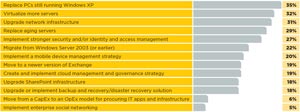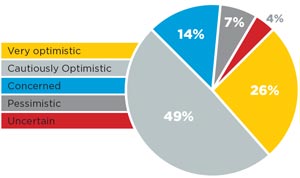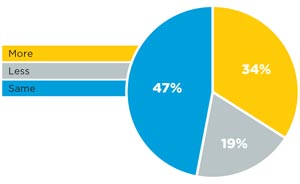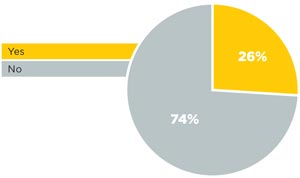In-Depth
IT's 2014 Agenda: Platform Migration and Tighten Security
Migrating to new platforms such as mobile devices and the cloud, boosting security and new usage models such as social networking and analyzing big data in real time, will drive this year's IT initiatives.
As every new year predictably brings an onslaught of out-of-shape people to the gym aiming to fulfill their resolutions to get in shape, the IT organization at XSport Fitness will get a workout of its own in 2014. The Chicago-based chain of upscale 24x7 fitness centers has kicked off an IT expansion effort. The company plans to upgrade its Windows XP-based PCs, select a tablet platform for trainers and other staff, digitize paper-based processes to comply with new heath care laws, integrate disparate systems such as point-of-sale and scheduling, and add storage to accommodate the new data this modernization will generate.
XSport, with 3,800 employees at locations in Illinois, New York and Washington DC, is in growth-mode with plans to open five new locations per year. CIO Tim Walter says XSport is looking to automate many processes to lower costs and improve service. "It's really about process improvement," Walter says. "We're looking at how to take out a lot of the redundant activities and do what we can do to automate this year."
Also looking to reduce redundancy is MB Trading, an online stock broker based in El Segundo, Calif. MB Trading plans to build a private cloud this year to eliminate one of its four datacenters. "One of our key objectives this year is to simplify our infrastructure and network," says William Floyd, MB Trading's chief technology officer. In addition to building out its private cloud, Floyd says MB Trading will replace its Windows XP desktops and Windows Server 2003 servers. It will also consider moving to a software defined network architecture.
IT Resolutions for 2014
Like XSport Fitness, Floyd says MB Trading will increase its IT spending this year. More than one third of Redmond magazine readers responding to an online survey last month plan to increase their IT spending in 2014. Nearly half (47 percent) will maintain last year's spending levels while 19 percent face lower budgets this year, according to the survey.
 "We're looking at how to take out a lot of the redundant activities and do what we can do to automate this year."
"We're looking at how to take out a lot of the redundant activities and do what we can do to automate this year."
Tim Walter, CIO, XSport Fitness
The biggest project facing IT decision makers this year will be dealing with PCs still running Windows XP. That comes as no surprise as on April 8, Microsoft will issue its final patch for Windows XP. Virtualizing more servers, upgrading network infrastructure, replacing aging servers, bolstering security and identity and access management are the other top priorities among respondents (see "What's On Your 2014 IT Agenda?").
 [Click on image for larger view.]
What's On Your 2014 IT Agenda? (Redmond magazine readership survey, 376 responses). With three months to go before Microsoft no longer supports Windows XP, 35 percent plan to finally replace it. While top priorities varied among respondents, it was the highest ranked agenda issue with 16 percent saying it was their number one priority. Other key priorities include network upgrades, implementing improved security and access management, server migration and virtualization.
[Click on image for larger view.]
What's On Your 2014 IT Agenda? (Redmond magazine readership survey, 376 responses). With three months to go before Microsoft no longer supports Windows XP, 35 percent plan to finally replace it. While top priorities varied among respondents, it was the highest ranked agenda issue with 16 percent saying it was their number one priority. Other key priorities include network upgrades, implementing improved security and access management, server migration and virtualization.
Addressing the looming Windows XP deadline will be a priority for many this year. Others have no concerns about it nor will they upgrade or replace them. Only one third of respondents have replaced all of their Windows XP-based machines, while more than half (51 percent) have some XP systems, and 15 percent say most or all their PCs are still running Windows XP. Of those that plan to upgrade their aging PCs, a majority (52 percent) will go to Windows 7, while 14 percent will move to Windows 8. A small but vocal minority (7 percent) will stay on Windows XP despite the fact Microsoft will discontinue support.
Windows Server 2003 is also reaching its end of life, but organizations have another year to address that. Microsoft will stop supporting Windows Server 2003 in July 2015. Nevertheless, 65 percent of respondents still have Windows Server 2003-based servers, including XSport Fitness. "We'll move them to Windows Server 2012 R2," Walter says. Most respondents plan to upgrade their servers this year. Only 21 percent say they'll continue to run their existing server OSes. Although Microsoft only released Windows Server 2012 R2 in October, 50 percent will upgrade their systems with the new release, while 44 percent will go with Windows Server 2008 R2. Some are moving to Linux (14 percent) and 13 percent will migrate to a cloud provider (multiple responses were allowed -- see "Planned Server Upgrades?").
 [Click on image for larger view.]
Planned Server Upgrades? (Redmond magazine readership survey, 326 responses) Of our survey respondents, 65 percent still have servers running Windows Server 2003 (or earlier). While 21 percent will keep what they have, 50 percent say they plan to upgrade to the latest version -- Windows Server 2012 R2 -- while 44 percent will go with Windows Server 2008 R2. Some will migrate to Linux servers (14 percent) or will move their app to a cloud provider (13 percent).
[Click on image for larger view.]
Planned Server Upgrades? (Redmond magazine readership survey, 326 responses) Of our survey respondents, 65 percent still have servers running Windows Server 2003 (or earlier). While 21 percent will keep what they have, 50 percent say they plan to upgrade to the latest version -- Windows Server 2012 R2 -- while 44 percent will go with Windows Server 2008 R2. Some will migrate to Linux servers (14 percent) or will move their app to a cloud provider (13 percent).
Microsoft's Transition
This will be a pivotal year for Microsoft. With a new CEO replacing Steve Ballmer this year, changes in Redmond are inevitable. Microsoft is fighting battles in numerous areas: It's competing in the multi-platform mobile world; holding onto its captive audience of Office and SharePoint users; keeping its foothold in the datacenter; and trying to achieve leadership in the new world of cloud computing and big data, despite formidable competition from Amazon Web Services, Apple, Google, VMware and the open source community.
Despite uncertainty over how Microsoft will fare in the next year or two, 26 percent are very optimistic and 49 percent are cautiously optimistic (see "Bullish on Microsoft Despite Company's Transformation"). Although 21 percent are either concerned or pessimistic, 4 percent are uncertain. Many IT decision makers are still evaluating what Microsoft has to offer compared to the numerous competitive options. For example, while XSport Fitness is considering Windows 8.1 tablets, Walter will also look at iPads and Android-based devices.
 [Click on image for larger view.]
Bullish on Microsoft Despite Company's Transformation (Redmond magazine readership survey, 381 responses) Two thirds are either very optimistic or cautiously optimistic about Microsoft's future.
[Click on image for larger view.]
Bullish on Microsoft Despite Company's Transformation (Redmond magazine readership survey, 381 responses) Two thirds are either very optimistic or cautiously optimistic about Microsoft's future.
 [Click on image for larger view.]
IT Budget Outlook for 2014. What are your spending plans this year? (Redmond magazine readership survey, 379 responses) Nearly half of all budgets will remain the same. slightly more than one-third plan to increase their IT spending this year.
[Click on image for larger view.]
IT Budget Outlook for 2014. What are your spending plans this year? (Redmond magazine readership survey, 379 responses) Nearly half of all budgets will remain the same. slightly more than one-third plan to increase their IT spending this year.
 [Click on image for larger view.]
Changing Employers this Year? Are you looking to change jobs this year? Consistent with last summer's Redmond Salary Survey, 26 percent are still going to check out the job market. Not surprisingly, the primary reason is for improved compensation and benefits. Fear of layoffs is another key factor.
[Click on image for larger view.]
Changing Employers this Year? Are you looking to change jobs this year? Consistent with last summer's Redmond Salary Survey, 26 percent are still going to check out the job market. Not surprisingly, the primary reason is for improved compensation and benefits. Fear of layoffs is another key factor.
Walter doesn't want to be tied to a specific mobile platform, so he'll likely look at developing apps in HTML 5. "We really want to have that mobile Web flexibility so we can use anything," he says.
At MB Trading, Floyd doesn't have any plans to upgrade its employees' PCs to Windows 8 at least for another year. "We've already tested it out and it breaks too many things in our environment," he says. "A lot of our customers are moving forward with that, which our [online trading] products are compatible with, but we've got a lot of internally-developed applications and drivers that just aren't compatible, so we're sticking with Windows 7."
MB Trading has its share of Microsoft-based platforms, including SharePoint 2010 and Exchange. As it consolidates its datacenter and uses more cloud computing services, though, Microsoft's place in the datacenter will be more limited. MB Trading currently uses Amazon Web Services for added compute and storage services. Floyd says he's keeping an eye on Windows Azure, but is leaning toward a provider that supports OpenStack, the widely supported open source cloud computing platform. He's determining whether that meets its promise of service provider portability.
When it comes to hybrid clouds and virtualization, Floyd remains skeptical about Microsoft. "Microsoft is still too Microsoft focused," he says. "They need to open up and be more supportive of what the real world uses, whether it be Linux or Solaris or other flavors of Unix. If they took more of an IBM approach, that would be viable. I've got this heterogeneous environment, but I don't think I'm unique. I believe there are a lot of companies out there that are similar to mine where they've got legacy systems they've got to deal with so it's not necessarily an option for them to say `I'll jump on the Microsoft bandwagon, because I'm 100 percent Microsoft.' There are companies that are like that, but most companies have more of a heterogeneous environment."